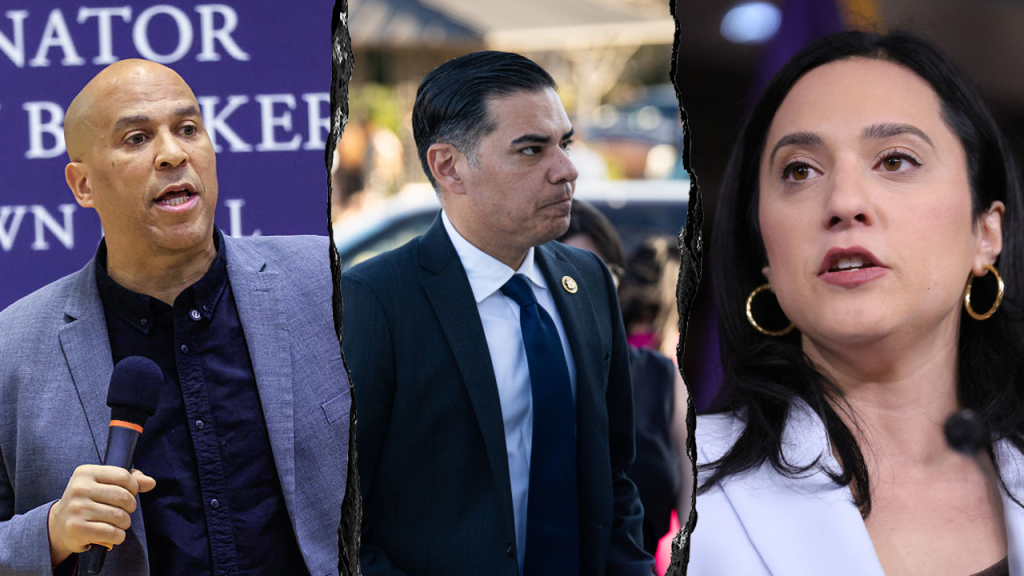In a recent development involving immigration and related constitutional rights, multiple Congressional Democrats are pushing to facilitate the return of Kilmar Abrego Garcia, an accused MS-13 member, from El Salvador to Maryland. The situation has garnered significant attention, as Maryland Senator Chris Van Hollen remains on the ground in El Salvador attempting to negotiate Garcia’s release. With claims of wrongful deportation and constitutional violations emerging, the dispute has become a focal point for several lawmakers, including Yassamin Ansari, who plans to support Van Hollen’s efforts.
| Article Subheadings |
|---|
| 1) Background on Kilmar Abrego Garcia’s Case |
| 2) Congressional Response and Legislative Actions |
| 3) Political Implications of the Situation |
| 4) The Role of CECOT in Detention Practices |
| 5) Broader Context of Immigration Policies |
Background on Kilmar Abrego Garcia’s Case
Kilmar Abrego Garcia, originally from El Salvador, was residing legally in Maryland. However, his situation took a drastic turn when he was deported back to El Salvador, where he is currently imprisoned. The controversy surrounding his deportation is profound, particularly since it allegedly contravenes a 2019 withholding order from an immigration judge. This order specifically prevented his removal, highlighting the legal complexities involved in his status. Garcia’s supporters, including several lawmakers, argue that his deportation constitutes a violation of both his rights and court rulings.
Congressional Response and Legislative Actions
In light of the ongoing situation, increasingly vocal criticism has emerged from Congressional Democrats, particularly those representing Maryland. Senator Chris Van Hollen has taken a leading role, negotiating with Salvadoran officials, including Vice President Felix Ulloa, though he has thus far faced opposition. Meanwhile, Representative Yassamin Ansari announced her intention to join Van Hollen in El Salvador, asserting that Garcia should be returned to Maryland. Other lawmakers, including Maxwell Frost and Robert Garcia, have also expressed their intentions to investigate the situation directly, seeking Congressional delegation authorization to conduct welfare checks on detained individuals at the infamous “Terrorism Confinement Center” (CECOT) in El Salvador.
Political Implications of the Situation
The case has not only sparked discussions surrounding individual rights but has also led to a broader debate over immigration policy within the current political landscape. Several Democratic lawmakers have decried the actions taken by the previous Trump administration, asserting it embodies a potential crisis for constitutional rights. An emotional plea from Yassamin Ansari frames the deportation of Garcia as part of a wider campaign suggesting that every American could face similar threats, drawing on her family’s history of fleeing authoritarianism. This call to action amplifies the urgency felt by many lawmakers who believe that the current actions surrounding Garcia’s case could set dangerous precedents for immigration practices.
The Role of CECOT in Detention Practices
The “Terrorism Confinement Center” (CECOT) plays a crucial role in the ongoing discourse about immigration enforcement and detention policy. Reports regarding the conditions within CECOT raise alarms among activists and lawmakers alike. The facility is notorious for holding various deportees, some of whom are classified as violent repeat offenders. Critics argue that the center’s operations are marred by issues of legality and due process, with assertions that individuals detained there are often subjected to administrative errors and oversight failures.
Broader Context of Immigration Policies
As the Garcia case unfolds, it remains emblematic of the broader immigration challenges facing the United States. The faltering immigration system, coupled with varied state policies, creates a complex legal environment. Calls for greater oversight reflect not just concerns about individual cases but also highlight a growing sense of urgency among lawmakers to reassess national immigration policies. The stark division between Democratic and Republican perspectives on immigration will likely continue to shape the discourse as legislators respond to the implications of high-profile cases like Garcia’s.
| No. | Key Points |
|---|---|
| 1 | Kilmar Abrego Garcia is a Salvadoran national who was legally residing in Maryland before being deported. |
| 2 | Congressional Democrats are actively seeking to intervene in Garcia’s case, asserting his deportation violates court orders. |
| 3 | The deportation case raises significant constitutional concerns about the treatment of detainees under U.S. immigration policy. |
| 4 | CEOT is known for holding violent offenders and is criticized for failing to ensure due process. |
| 5 | The case illustrates partisan divides on immigration policy and the need for reform in U.S. immigration practices. |
Summary
The case of Kilmar Abrego Garcia underscores a contentious intersection of immigration law, individual rights, and broader political battles within the U.S. Congress. With multiple lawmakers taking action to bring attention to his situation, the unfolding narrative not only highlights Kentuckian’s individual struggle but also reflects wider concerns about the implications of current immigration policies. As attention remains focused on CECOT and Garcia’s potential return to Maryland, the future of U.S. immigration practices hangs in the balance.
Frequently Asked Questions
Question: Who is Kilmar Abrego Garcia?
Kilmar Abrego Garcia is a Salvadoran national who was residing legally in Maryland before being deported back to El Salvador, where he is currently imprisoned under allegations related to gang affiliation.
Question: Why are Congress members traveling to El Salvador?
Members of Congress are traveling to El Salvador to advocate for the return of Kilmar Abrego Garcia and conduct welfare checks on him and other detainees held at the Terrorism Confinement Center.
Question: What is the significance of CECOT in this case?
The Terrorism Confinement Center, known as CECOT, is significant because it is where Garcia is currently held, and it has been criticized for its treatment of deportees and questionable detention practices.


